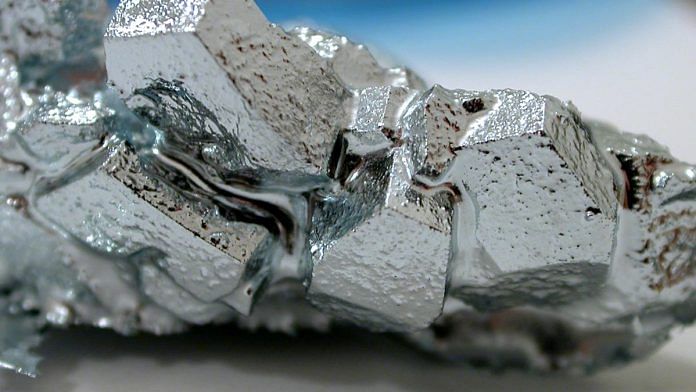New Delhi: India first critical minerals policy, which is currently in the works, proposes to create a common pool for stockpiling these essential resources with friendly countries or groupings of which India is a part, like the Quadrilateral Alliance, or Quad, comprising Australia, Japan, and the US, ThePrint has learnt.
In addition, the policy also proposes identifying critical mineral blocks in other countries by India for investment, government sources familiar with the matter told ThePrint.
India is already in talks with countries such as Argentina, Australia, Chile, and Mongolia, which are endowed with critical mineral assets such as lithium and cobalt. A team of officials from the Ministry of Mines and Minerals is also going to Mongolia in October to participate in a mining expo and discuss possibilities of investing in potential mineral blocks of copper.
The critical minerals policy, government sources said, also proposes creation of a knowledge network for research in the sector.
“The policy is under deliberations with stakeholders. The policy will be important in ensuring India’s energy security,” a senior official of the Ministry of Mines and Minerals, who did not want to be named, said.
All the moves in the proposed policy are aimed at addressing the supply chain vulnerabilities of critical minerals, which are vital to technology and industry. Critical minerals, including rare earth elements (REE), are used in numerous industries, from aerospace and defence to renewable energy, telecommunications, and semiconductors.
Presently, India is dependent on China and other countries to meet its requirement of critical minerals and REE such as lithium, which are the building blocks of modern-day technology.
Over the last year, however, India has undertaken a slew of initiatives in the critical minerals sector. It also underscored the importance of critical mineral supply chains in the G20 Energy Transition Ministers’ meeting in Goa in June 2023.
Also Read: India releases list of 30 critical minerals crucial for ‘economic development, national security’
India’s critical minerals push
India took several significant steps in the critical mineral sector this year. This included the release in June of a comprehensive list of 30 critical minerals necessary for economic development and national security.
India also joined the Minerals Security Partnership, a US-led alliance of 14 developed countries in June to “ensure that critical minerals are produced, processed, and recycled in a manner that supports the ability of countries to realize the full economic development benefit of their geological endowments”.
In August, Parliament cleared amendments to the Mines and Minerals (Development and Regulation) Act, 1957, paving the way for commercial mining of six critical minerals — lithium, beryllium, niobium, tantalum, titanium and zirconium — and deep-seated minerals like gold, silver, and copper. Currently, only government agencies are allowed to explore and mine these minerals.
Parliament also cleared amendments to the Offshore Areas Mineral (Development and Regulation) Act, 2002, which seek to allow commercial mining of mineral resources in offshore areas.
G20 focus area too
The outcome document of the G20 Energy Transition Ministers’ meeting held in Goa on July 22 emphasised the “need to maintain reliable, responsible, and sustainable supply chains of such critical minerals and materials”.
This, significantly, was the first time that a G20 meeting on energy transition focused on the supply chain vulnerabilities of critical minerals.
The Indian presidency of the G20 also proposed high-level guiding principles on a voluntary basis for accelerating the development of the global value chain of critical minerals required for sustainable energy transitions. These principles take into account national circumstances, needs, and priorities.
(Edited by Asavari Singh)
Also Read: As US-China trade war heats up, a new era of govt-driven industrial policy is taking shape



